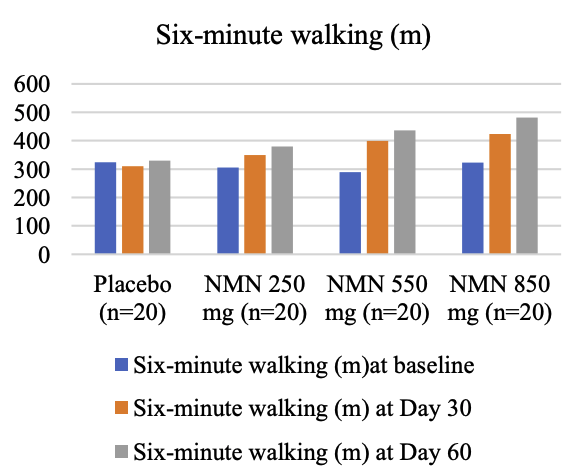A recent clinical trial evaluated the effects of NMN supplementation in healthy adults.
*While this study has been published, the data analysis and methods raise concerns regarding reliability. Further analysis or additional validation may be necessary to fully assess the findings. Included/reviewed for documentation purposes.*
Key Points:
- NMN increased NAD+ blood levels
- Physical performance steadily improved in the NMN groups
- Quality of life was enhanced
- No effects on insulin resistance were observed
Clinical Trial Evaluates NMN in Healthy Adults
This was a 60-day randomized, placebo-controlled clinical trial involving 80 healthy participants between the ages of 30 and 65.
Participants were divided into 4 groups and assigned the following treatments:
- Placebo
- 250 mg NMN
- 550 mg NMN
- 850 mg NMN
Blood NAD+ levels, a 6-minute walking test, the homeostatic model assessment for insulin resistance (HOMA-IR) index, the SF-36 questionnaire, and biological blood age were measured.
Significant Increase in NAD+ Levels
The NMN groups showed significantly higher increases in NAD+ compared to placebo at each time point.
“By day 30, all groups aside from the placebo group saw an increase in NAD concentration in response to an increase in NMN concentration.”
Enhanced Physical Performance
The groups receiving NMN showed significant improvements in walking distance after 30 and 60 days compared to their measurements at the start of the study.
In contrast, the placebo group saw a decline at 30 days and a slight improvement by day 60.
Compared to the placebo group, the NMN-treated groups consistently performed better in the six-minute walking test, with the 850 mg group showing the most significant improvement.
“At both time points, the 850 mg NMN group showed the most improvement, walking noticeably farther than the 250 mg and 550 mg groups.”
This figure shows that the NMN-treated groups consistently increased their walking distance at 30 days (orange bar) and 60 days (gray bar) compared to baseline (blue bar), while the placebo group showed no improvement.

Improved Quality of Life
The SF-36 questionnaire measures quality of life and well-being.
The NMN groups showed significantly higher SF-36 scores compared to the placebo.
“All NMN-treated groups outperformed the placebo group on day 60 in terms of SF-36 scores, suggesting that NMN supplementation improves the quality of life connected to health.”
The group receiving 850 mg of NMN showed the most significant increase in SF-36 scores.
“A higher dose of NMN may be more effective as there was the highest improvement in health-related quality of life in the case of 850 mg.”
No Effect on Insulin Resistance
All groups showed an increase in HOMA-IR (a measure of insulin resistance), but there were no significant differences between the placebo and NMN groups, indicating that NMN did not affect insulin resistance during the study.
Conclusion
In healthy adults, NMN supplementation increased blood NAD+ levels, improved physical performance and enhanced quality of life.
The 850 mg group showed the most significant improvements in physical performance and quality of life.
